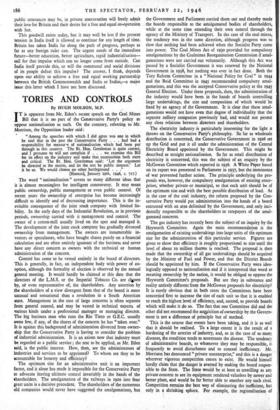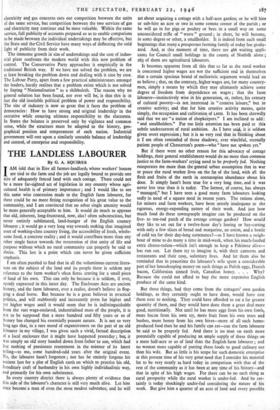TORIES AND CONTROLS
By HUGH MOLSON, M.P.
IT is apparent from Mr. Eden's recent speech on the Goal Mines Bill that it is no part of the Conservative Party's policy to oppose nationalisation as such. On the contrary, referring to Mr. Morrison, the Opposition leader said: " Among the speeches with which I did agree was one in which he said that in the past the Conservative Party . . . had had a responsibility for measures of nationalisation which had been put through in this country. The Rt. Hon. Gentleman is quite correct, and I presume he will not complain if . . . we examine this Bill for its effect on the industry and make that examination both stern and critical. The Rt. Hon. Gentleman said: ' Let the argument be directed to the merits, and let the test be public interest.' Let it be so. We would choose no other battleground . . ."
(Hansard, January .29th, 1946, c. 717.)
The word " nationalisation " covers so many different ideas that it is almost meaningless for intelligent controversy. It may mean public ownership, public management or even public control. Of recent years the ownership of enterprise has become increasingly difficult to identify and of decreasing importance. This is the in- evitable consequence of the joint stock company with limited lia- bility. In the early days of the Industrial Revolution, as in previous periods, ownership carried with it management and control. The owner of a cotton-mill usually lived on the spot and managed it. The development of the joint stock company has gradually divorced ownership from management. The owners are innumerable in- vestors or speculators, who have bought shares purely on a financial calculation and are often entirely ignorant of the business and never have any direct concern as owners with the technical or human administration of the concern.
Control has come to be vested entirely in the board of directors. This is generally, in fact, an independent body with power of co- option, although the formality of election is observed by the annual general meeting. It would hardly be claimed at this date that the directors of the L.M.S. or the Imperial Tobacco Co. are clipsen by, or even representative of, the shareholders. Any assertion by the shareholders of a view divergent from that of the board is more unusual and sensational than a revolution in a South American state. Management in the case of large concerns is often separate from general control, and may be vested in technical experts of various kinds under a professional manager or managing director. The big business man who runs the Rio Tinto or G.E.C. usually
owns few, if any, of the shares of the concern he has " taken over." It is against this background of administration divorced from owner-
ship that the Conservative Party is having to consider the problem of industrial administration. It is an axiom now that industry must be regarded as a public service ; the test to be applied, as Mr. Eden said, is the public interest. How, then, are the administrators of industries and services to be appointed? To whom are they to be accountable for honesty and efficiency?
The optimum size for an administrative unit is an important factor, and it alone has made it impossible for the Conservative Party to advocate leaving ultimate control invariably in the hands of the shareholders. The amalgamation of the railways in 1920 into four great units is a decisive precedent. The shareholders of the numerous old companies would never have suggested the amalgamations, but the Government and Parliament-carried them out and thereby made the boards responsible to the amalgamated bodies of shareholders, while at the same time extending their own control through the agency of the Ministry of Transport. In the case of the coal mines, the tendency was in the same direction, although progress was so slow that nothing had been achieved when the Socialist Party came into power. The Coal Mines Act of 193o provided for compulsory amalgamations by the Coalmines Reorganisation Commission if amal- gamations were not carried out voluntarily. Although this Act was passed by a Socialist Government it was renewed by the National Government in 1938, but nothing was ever in fact done. Both the Tory Reform Committee in a "National Policy for Coal" in 1944 and the Reid Committee in 1945 recommended compulsory amal- gamations, and this was the accepted Conservative policy at the 1945 General Election. Under these proposals, then, the administration of the industry would have been in the hands of boards controlling large undertakings, the size and composition of which would be fixed by an agency of the Government. It is clear that these amal- gamations would not have even that degree of individuality that the separate colliery companies previously had, and would not permit any close relations between directors and shareholders.
The electricity industry is particularly interesting for the light it throws on the Conservative Party's philosophy. So far as wholesale distribution is concerned, the Conservative Government in 1926 set up the Grid and put it all under the administration of the Central Electricity Board appointed by the Government. This might be described as straight nationalisation. So far as retail distribution of electricity is concerned, this was the subject of an enquiry by the McGowan Committee which reported in 1936. A White Paper based on its report was presented to Parliament in 1937, but the imminence of war prevented further action. The principle underlying the pro- posals was, however, the compulsory amalgamation of existing enter- prises, whether private or municipal, so that each unit should be of the optimum size and with the best possible distribution of load. As in the case of the coal industry, the reform proposed by the Con- servative Party would put administration into the hands of a board entrusted with an area delimited by the Government, and only inci- dentally responsible to the shareholders or ratepayers of the amal- gamated concerns.
The gas industry has recently been the subject of an inquiry by the Heyworth Committee. Again the main recommendation is the amalgamation of existing undertakings into large units of the optimum size for the administration of this particular service. Figures are given to show that efficiency is roughly proportional to size until the level of about to million therms is reached. The proposal is then made that the ownership of all gas undertakings should be acquired by the Minister of Fuel and Power, and that the District Boards should be appointed by him. If the Conservative Party were ideo- logically opposed to nationalisation and if it interpreted that word as meaning ownership by the nation, it would be obliged to oppose the Heyworth Committee's proposals. But are they in substance and reality entirely different from the McGowan proposals for electricity? It is surely obvious that in both cases the Committees have been concerned first to increase the size of each unit so that it is enabled to reach the highest level of efficiency, and, second, to provide boards which will make it do so. The fact that one Committee did and the other did not recommend the acquisition of ownership by the Govern- ment is not a difference of principle but of method.
This is the course that events have been taking, and it is as well that it should be realised. To a large extent it is the result of a hardening of the arteries of industry, and, as in the case of so many diseases, the condition tends to accentuate the disease. The tendency of administrative boards, to whomever they may be responsible, is frequently to avoid disturbance and to conceal inefficiency. Mr. Morrison has denounced " private unenterprise," and this is a danger wherever vigorous competition ceases to exist. He would himself hardly claim that the danger is averted by making the board respon- sible to the State. The State would be at least as unwilling as any private concern to see its equipment rendered valueless by newer and better plant, and would be far better able to smother any such rival. Competition remains the best way of eliminating the inefficient, but only in a shrinking sphere. For example, the regionalisation of
electricity and gas concerns cuts out competition between the units of the same service, but competition between the two services of gas and electricity may continue, and be most valuable. Within the same service, full publicity of accounts prepared so as to enable comparison to be made between the individual undertakings may be effective, but the State and the•Civil Service have many ways of deflecting the cold light of publicity from their work.
The immense growth in size of undertakings and the cost of indus- trial plant confronts the modern world with this new problem of control. The Conservative Party approaches it empirically in the traditional British way. If we have not solved the problem, we are at least breaking the problem down and dealing with it case by case. The Labour Party, apart from a few practical administrators amongst the leaders, hardly realises that a problem exists which is not solved by lisping " Nationalisation " as a shibboleth. The reason why no general solution has been found, nor ever will be; is that this is in fact the old insoluble political problem of power and responsibility. The size of industry is now so great that it faces the problem of democracies : How to have strong and original leadership in the executive while ensuring ultimate responsibility to the electorate. In States the balance is preserved only by vigilance and common sense, while the structure must be adapted to the history, geo- graphical position and temperament of each nation. Industrial government will rest upon a similarly unstable balance of leadership and control, of enterprise and responsibility.































 Previous page
Previous page